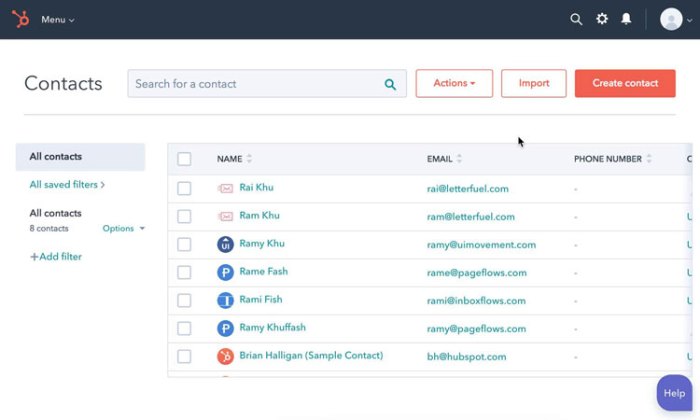Project management software with crm – In today’s dynamic business environment, efficient project management and robust customer relationship management (CRM) are no longer optional but essential for success. Integrating these two critical functions into a single, streamlined system offers significant advantages in terms of productivity, profitability, and customer satisfaction. This comprehensive guide explores the synergy between project management software and CRM, detailing their combined benefits, key features, selection criteria, and frequently asked questions.
Understanding the Synergy: Project Management and CRM Integration: Project Management Software With Crm
Traditionally, project management and CRM were treated as separate entities. Project management focused on internal processes, timelines, and resource allocation, while CRM concentrated on external customer interactions, sales, and marketing. However, integrating these systems creates a powerful, unified platform that fosters better communication, improved collaboration, and enhanced overall efficiency. This integration bridges the gap between internal project execution and external customer engagement, providing a 360-degree view of the customer journey and project lifecycle.

Source: selecthub.com
Benefits of Integrating Project Management and CRM, Project management software with crm
- Improved Customer Satisfaction: By having a clear view of project progress and customer interactions, teams can proactively address concerns and deliver projects on time and within budget, leading to higher customer satisfaction.
- Enhanced Collaboration: Integrated systems facilitate seamless communication and collaboration between project teams, sales, marketing, and customer support, ensuring everyone is on the same page.
- Increased Efficiency and Productivity: Automating tasks, streamlining workflows, and eliminating data silos lead to significant improvements in efficiency and productivity across the organization.
- Better Resource Allocation: A unified view of projects and customer needs enables better resource allocation, optimizing team utilization and minimizing bottlenecks.
- Improved Sales and Lead Conversion: By tracking project progress and customer interactions, sales teams can identify opportunities for upselling, cross-selling, and improved lead conversion rates.
- Data-Driven Decision Making: Integrated systems provide valuable data and insights into project performance, customer behavior, and sales trends, enabling data-driven decision making.
- Reduced Operational Costs: Automating tasks and streamlining processes lead to reduced operational costs and improved overall profitability.
Key Features of Project Management Software with CRM Integration
Effective project management software with CRM integration typically offers a range of features designed to enhance collaboration, efficiency, and customer relationship management. These features can vary depending on the specific software, but some common ones include:
Core Features:
- Centralized Database: A single, unified database stores all customer and project information, eliminating data silos and ensuring data consistency.
- Project Management Tools: Features such as task management, Gantt charts, Kanban boards, time tracking, and resource allocation are essential for effective project execution.
- CRM functionalities: Contact management, lead nurturing, sales pipeline management, and customer support tools are crucial for effective customer relationship management.
- Workflow Automation: Automating repetitive tasks, such as lead assignment, task notifications, and report generation, frees up time for more strategic activities.
- Reporting and Analytics: Comprehensive reporting and analytics capabilities provide valuable insights into project performance, customer behavior, and sales trends.
- Integration with other systems: Seamless integration with other business applications, such as accounting software and email marketing platforms, further enhances efficiency.
- Customizable Dashboards: Customizable dashboards provide a personalized view of key performance indicators (KPIs) and project status.
- Real-time Collaboration Tools: Features like instant messaging, file sharing, and video conferencing facilitate seamless communication and collaboration.
Selecting the Right Project Management Software with CRM Integration
Choosing the right project management software with CRM integration requires careful consideration of several factors. Here are some key criteria to consider:
- Business Needs and Size: The software should align with the specific needs and size of your business. Small businesses may require simpler solutions, while larger enterprises may need more robust and scalable systems.
- Budget: Software pricing varies widely, so it’s crucial to establish a clear budget before starting your search.
- Integration Capabilities: Ensure the software integrates seamlessly with existing systems and applications to avoid data silos and enhance efficiency.
- User-Friendliness: The software should be intuitive and easy to use for all team members, regardless of their technical expertise.
- Scalability: Choose a solution that can scale with your business as it grows, avoiding the need for costly migrations in the future.
- Customer Support: Reliable customer support is essential to address any issues or questions that may arise.
- Security: Data security is paramount, so ensure the software provides robust security features to protect sensitive customer and project information.
Frequently Asked Questions (FAQ)
- Q: What are the key differences between standalone project management software and integrated project management/CRM solutions?
A: Standalone project management software focuses solely on internal project execution, while integrated solutions combine project management with CRM functionalities, providing a unified view of projects and customer interactions. The latter offers a more holistic approach, enhancing collaboration and improving customer relationships.
- Q: How can I ensure successful implementation of project management software with CRM integration?
A: Successful implementation requires careful planning, user training, and ongoing support. Clearly define your goals, involve key stakeholders, and establish a robust change management process.
- Q: What are some examples of popular project management software with CRM integration?
A: Several popular platforms offer this integration, including Salesforce, Microsoft Dynamics 365, HubSpot, Zoho CRM, and many others. Each offers different features and pricing models.
- Q: How can I measure the ROI of implementing project management software with CRM integration?
A: Track key metrics such as project completion rates, customer satisfaction scores, sales conversion rates, and operational costs. Compare these metrics before and after implementation to assess the return on investment.
- Q: Is cloud-based or on-premise software better for project management with CRM?
A: Cloud-based solutions offer greater flexibility, scalability, and accessibility, while on-premise solutions provide greater control over data and security. The best choice depends on your specific needs and IT infrastructure.
Conclusion
Integrating project management software with CRM offers significant advantages for businesses of all sizes. By streamlining workflows, enhancing collaboration, and improving customer relationships, these integrated systems contribute to increased efficiency, improved profitability, and enhanced customer satisfaction. Choosing the right software and implementing it effectively are crucial for realizing the full potential of this powerful combination.
References
- Salesforce
- Microsoft Dynamics 365
- HubSpot
- Zoho CRM
- ProjectManager.com (for general project management information)
Call to Action
Ready to transform your business operations with the power of integrated project management and CRM? Contact us today for a free consultation to discuss your specific needs and explore the best solutions for your organization.
Helpful Answers
What are the key benefits of using project management software with CRM?
Improved client communication, enhanced project visibility, streamlined workflows, better resource allocation, increased productivity, and improved data analysis capabilities.
How much does project management software with CRM cost?
Pricing varies greatly depending on the software, features, and number of users. Options range from free plans with limited functionality to enterprise-level solutions with substantial costs.
What are some examples of project management software with CRM integration?

Source: vendasta.com
Many popular platforms offer integrations or are built with CRM functionality. Specific examples depend on the chosen CRM and project management software. Researching specific software options will provide more concrete examples.
Is it difficult to implement project management software with CRM?
Implementation complexity varies depending on the chosen software and the size/complexity of the business. Many vendors offer support and training to facilitate a smooth transition.
